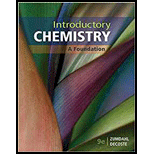
Concept explainers
. Indicate the missing molecule in each of the following substitution reactions.
a.
Want to see the full answer?
Check out a sample textbook solution
Chapter 20 Solutions
Introductory Chemistry: A Foundation
Additional Science Textbook Solutions
Chemistry: Structure and Properties
Chemistry
Chemistry: The Central Science (14th Edition)
Chemistry: An Introduction to General, Organic, and Biological Chemistry (13th Edition)
Chemistry For Changing Times (14th Edition)
- CH2-CH2-CH3 Type of functional group r. CH2-CH2-CH3 Common Name Type of functional group H3C-C-o IUPAC H3C- Common Name H,C-CH,-CH,-CH,-CH,-NH-ċ-CH -CH3 t. Type of functional grouparrow_forwardPair the following A. alkene B. alcohol C. aldehyde D. carboxylic acid E. ester F. ether G. alkyne CH3-CH2-CH2-CH=O ______ CH2-CH2-CH2-CH2-CH2-OH ______ CH3-CH2-CH2-C=O OCH3 CH3-CH2-CH2-O-CH2-CH3 CH3-CH2-CH2-C=O OH CH3-NH-CH2-CH2-CH3 ______ CH3-CH2-CH=CH-CH3 ______arrow_forward1. Identify the SYSTEMATIC name of the aliphatic hydrocarbon a. 1-pentenyicyclopentane b. 1-cyclopentylpent-2-yne c. 1-pentenecyclopent-2-yne d. 1-pentenyicyclopentane 2. Identify the SYSTEMATIC name of the aliphatic hydrocarbon a. Trans-1,2-propylcyclopropane b. Trans-1,2-diisopropylcyclopropane c. Cis-1,2-propylcyclopropane d. Cis-1,2-diisopropylcyclopropane 3. Identify the SYSTEMATIC name of the aliphatic hydrocarbon 3,10-dimethyl-2-decacen-6-yne 3,10-dimethyl-2-dodocen-6-yne 3,10-dimethyl-10-decacen-6-yne d. 3,10-dimethyl-10-dodocen-6-yne a. b. C. 4. Identify which type of isomer the following structures represent HO a. Skeletal Isomer b. E/Z isomer c. Cis/Trans isomer OH OH d. Positional isomer 5. Identify which type of isomer the following structures represent a. Skeletal Isomer Br b. E/Z isomer c Cis/Trans isomer Br d. Positional isomerarrow_forward
- . Chlorination is the reaction between an alkyne and ______ atoms to produce a dihalide.arrow_forwardWrite a balanced chemical equation for the reaction of ethene with oxygen. O a. C2H4(g) + 302(g) → 2CO2(g) + 2H2O(g) O b. 2C2H2(g) + 502(g) → 4CO2(g) + 2H2O(g) O c. CH4(g) + 2O2(g) → CO2(g) + 2H2O(g) O d. C2H4(g) + 202(g) → 2CO2(g) + 2H2(g) O e. 2C2H6(g) + 702(g) →> 4CO2(g) + 6H2O(g)arrow_forward1. What is the alkane product from the reaction of C7H13COONa and NaOH? a. pentane b. hexane c. butane d. heptane 2. What is the resulting alkane if we have C5H11F and a C5H11F as reactants in Wurtz synthesis? a. hexane b. octane c. nonane d. decane 3.What is the resulting alkane if we have 2C2H5Cl as reactants in Wurtz Synthesis reaction? a. ethane b. butane c. hexane d. octanearrow_forward
- 4. Which of the following has isomeric forms?a. C2H3Clb. C2H5Clc. C2HCld. C2H4Cl2 5. Which of the following hydrocarbons always gives the same product when one of its hydrogen atoms is replaced by a chlorine atom.a. Hexaneb. Hex-1-enec. Cyclohexaned. Cyclohexenearrow_forward3. Name each of these compounds (including isomer prefixes) and identify the functional groups present. a. H CH CH₂CH/ CH₂ Br b. H CH H El CHSarrow_forwarda. C4H8 + Cl2 -----> C4H8Cl2 b. C6H6 + Cl2 -----> C6H5Cl + HCl c. C3H6 + HCl -----> C3H7Cl Do they have an addition reaction? please explainarrow_forward
- A hydrocarbon containing one or more -C=C- bonds. a. addition reaction b. aliphatic compound c. alkene d. alkyne e. aromatic hydrocarbon f. hydration g. hydrogenation h. monomer i. phenyl group j. polycyclic aromatic hydrocarbon k. polymerarrow_forward1. 1-Ethoxy-2-methylpropane A. Acid anhydride B. Acid chloride C. Ether D. None of the choices 2. C8H16 A. Alkane B. Alkene C. Cycloalkane D. Two of the choices 3. How many CH2 is present in this compound? (Please refer to the timage attached.) A. 6 B. 5 C. 4 D. 3arrow_forwardName the alkyl halide below CI a. 4-chlorohexane O b. chlorohexane O c. 1-ethyl-1-chlorobutane O d. 3-chlorohexanearrow_forward
